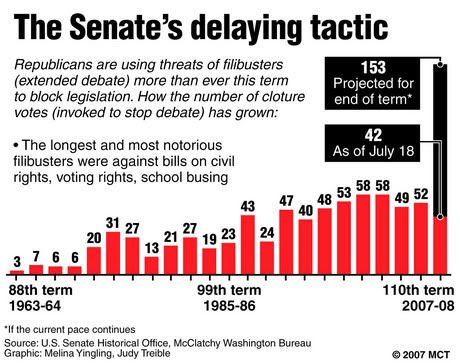McClatchy reports:
The presidential campaign erupted Friday into a full-blown debate over how best to stabilize Pakistan as candidates vied in the few days before Thursday's Iowa caucuses to show who was best prepared to lead the fight against terrorism.
In the wake of Thursday's assassination of Pakistani opposition leader Benazir Bhutto, Republican and Democratic presidential candidates spent much of Friday laying out specific policies they'd follow now -- or, for Democratic Illinois Sen. Barack Obama and two former Republican governors, Mike Huckabee of Arkansas and Mitt Romney of Massachusetts, trying to convince voters that they're qualified to play in that league.
The rivals with thicker foreign-policy resumes offered detailed blueprints of how they would deal with Pakistan. New Mexico Gov. Bill Richardson, a former United Nations ambassador, struck first, telling a Des Moines audience that the United States should give Pakistan "not one penny more until [President Pervez] Musharraf is gone and the rule of law is restored."
Most Democratic candidates wouldn't go that far; New York Sen. Hillary Rodham Clinton offered a multi-part plan to restore stability but stopped short of calling for Musharraf's ouster.
"I don't think the Pakistani government at this time under President Musharraf has any credibility at all," Clinton said as she visited Story City. "They have disbanded an independent judiciary. They have oppressed a free press."
She called for a "full, independent, international investigation."
Senate Foreign Relations Committee Chairman Joseph Biden, D-Del., urged putting new pressure on Musharraf to hold "fair elections as soon as possible," while Sen. Christopher Dodd, D-Conn., a senior Foreign Relations member, urged that Pakistan's elections be postponed.
The fight was not just over ideas -- it was over foreign policy pedigree, too.
Dodd took aim at Clinton, questioning her experience.
"It isn't enough to be sitting on the sidelines, watching your husband deal with these problems over the years," Dodd said. And he termed Richardson's call for Musharraf to resign "a dangerous idea."
GOP backs Musharraf
The Republican debate had a different tone. Most candidates were more willing to tolerate, and in some cases even praise, Musharraf, while they painted Democrats as unsteady and weak.
"I don't think it would be a good idea to call for him [Musharraf] to step down now," former Tennessee Sen. Fred Thompson told CNN on Friday. "I hope that we as candidates out here don't start lobbing these ideas that get plenty of attention but are not very sound. This is a serious matter. It's going to be with us for some time, and we need to be deliberate in our approach to it because we have several interests involved."
Arizona Sen. John McCain said, "You're going to hear a lot of criticism about Musharraf, that he hasn't done everything we wanted him to do, but he did agree to step down as head of the military, and he did get the elections."
Romney stressed his experience as a business executive -- saying he could put together "a great team" to help manage crises -- while Huckabee linked the assassination to illegal immigration, saying it highlighted the importance of securing the nation's borders by building a fence along the Mexican border.



